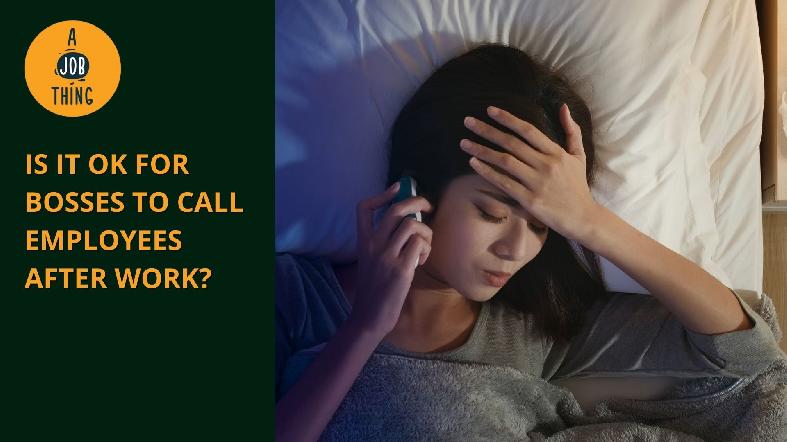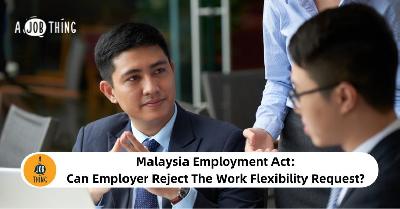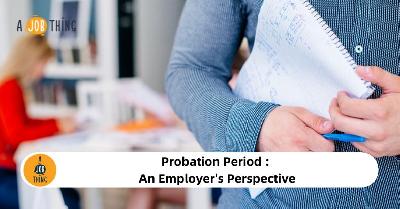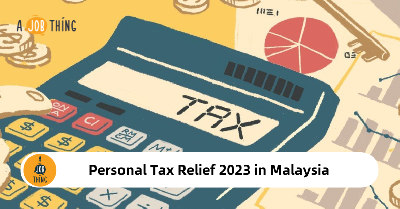
Do Employers Have the Right to Call Staff After Hours?
Create Job Description Using AI
Write appealing job descriptions for any job opening to attract the most qualifield and suitable candidates. FOR FREE.
try now
The pandemic has served as a wake-up call to address society's mental health challenges in general and workplace mental health concerns in particular. Due to a succession of lockdowns and curfews over the last two years, most firms have been obliged to implement a previously unheard-of arrangement allowing employees to work from home.
Employers and employees alike faced major difficulties and obstacles in adapting to the transformation, particularly in terms of technology and communication, logistics and human resource, and maintaining the work-life balance.
Employees' stress levels have risen, and in certain cases, burnout has resulted as a result of the pandemic. Working from home provided more flexibility, but it also meant that work-life balance was thrown out the window. Flexibility became an unintentional cloak for the blurring of and the increase of working hours.
The freedom to disconnect is gaining popularity around the world
Portugal
Portugal recently approved laws preventing businesses from contacting employees after working hours. It seeks to establish boundaries between companies and employees, particularly those who work remotely.
Employers who seek to contact employees beyond the working hours will face fines under the newly enacted rule.
Germany
Following a court decision that an employee's failure to answer his work phone after work time was not a justifiable reason to dismiss him, Germany implemented a similar ban on employers in 20132 and 2016. France decided to codify the prohibition on employees being available for workplace communication after working hours.
Other countries
The wave of legislation aimed at creating a healthier workplace has also swept several other countries, including Spain where companies are required to develop a policy, which must be negotiated with employee representatives and include measures to allow employees to "digitally disconnect", Italy, India, and others.
Do Malaysian workers have the right to disconnect?
There is currently no law barring or discouraging employers from contacting employees after hours. This issue is not addressed in the recently proposed revisions to the Employment Act of 1955 (EA 1955) or the Occupational Safety and Health Act of 1994 (OSHA 1994).
Employees' mental health issues are, at the end of the day, the fundamental concept of the freedom to disconnect. According to a recent survey, 92% of Malaysians are worried about losing their jobs, 51% of the 17,595 employees polled experience work-related stress, and 53% receive less than seven hours of sleep each night.
Furthermore, according to a 2020 poll, Malaysia has the highest proportion of employees feeling significant levels of anxiety, as well as a higher proportion of people working from home during the Covid-19 pandemic than the global average.
63% of Malaysian workers said that it is challenging to achieve work-life balance. These figures present a vivid picture of employee wellbeing in Malaysia, leading to the conclusion that some type of action is both necessary and overdue.
The right to disconnect will not and cannot be implemented in a clear manner. Depending on the industry and kind of business, there should be some exceptions and derogations.
Employees and employers in France are free to choose the arrangements that best suit their interests and area of work, and the law requires employers and employees to negotiate annual limitations on working and personal hours.
This strategy allows companies and employees to decide how best to handle the situation, ensuring that company objectives are balanced with employee wellbeing. In our local context, the million-ringgit question is whether our current laws support the execution of such arrangements.
Laws regarding employees' mental health
Employers have a duty to safeguard the safety, health, and welfare of all their employees at work, according to Section 15 of OSHA 1994. Employers who fail to comply face fines of up to RM50,000 and/or imprisonment of up to two years.
While OSHA 1994 may be limited in its application to a few specific areas, pending modifications show a welcome shift to include all industries.
"Health" is defined as "a state of total physical, mental, and social well-being, not only the absence of disease," according to the OSHA Guidelines of 1994.
The Guidelines go on to say that "working environment" might refer to "the workplace itself; all plants at the workplace; the physical environment, and the psychological environment."
It also defines "stress" as when the demands on an employee exceed their capacity to cope with their responsibilities, and it requires employers to detect stressful situations in the workplace and implement precautions to reduce the risk.
Although the OSHA 1994 and the recommendations or regulations that follow it are not prescriptive in terms of mental health, it does put a legal obligation on employers to protect the employees' mental health.
Setting healthy boundaries
Employees can propose that their employers better limit working hours, set specified boundaries, and implement policies that respect work-life balance, particularly if their argument is based on the need to maintain health.
The proposed revisions to the EA 1955 hint at a trend toward greater work-life balance, with a clause allowing flexible working hours to be arranged upon request by the employee, albeit the employer has the option to refuse.
The proposed revisions also seek to reduce the number of hours worked per week for employees covered by the EA 1955 from 48 to 45, a further step toward achieving work-life balance.
Even though the EA 1955 is limited in its application to specified types of employees, all employees could argue that health and well-being should not be limited to certain groups and that all employers should seriously consider initiatives to promote mental health.
We are at a fork in the road to becoming a globalised nation and rebranding ourselves as a high-income economy. If we are to develop a sustainable workforce, the present firmly held belief that an employee must produce maximum productivity in terms of hours may have to give way to other conflicting interests.
The protection of work-life balance and mental health may take its appropriate home in the law books as a result of dispute resolution; and, as with everything else, businesses who are ahead of the competition will have less exposure to worry about.
Source: Skrine





